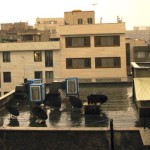via LobeLog
by Jasmin Ramsey
Al-Monitor offers a refreshing article on one of Iran’s worst-kept secrets:
Although satellites are contraband, somehow many people manage to own one. It’s estimated that 50-70% of households in Tehran have satellite dishes to broadcast their favorite news, music and movie channels. Even in a holy city such as Qom and other [...]
via Lobe Log
Laura Rozen reports that the six world power negotiating team may not be revamping its package to be more generous with Iran as many were hoping (Russia has not even signed on to the new version yet) ahead of resumed talks which likely won’t take place until January.
[...]
via Lobe Log
Former Iran-desk State Department staffer Reza Marashi and journalist Sahar Namazikhah remind us that Iran’s influnetial Ministry of Intelligence and Security (MOIS) has publicly recognized the benefits of negotiating with the US to avert a military conflict through a report that’s available on their website. “To that end, the Intelligence Ministry [...]
via Lobe Log
During his first Press Conference today following his successful second-term campaign, President Barak Obama emphasized that the United States wants to peacefully resolve the tense dispute over the Islamic Republic’s controversial nuclear program (the US is reportedly considering a more-for-more negotiating strategy) but denied that talks are “imminent”. Importantly, he didn’t reject [...]
via Lobe Log
The answer to this question is simple: there is no such thing as one Tehran. Opinions vary and arguments to back up the case for either Barak Obama or Mitt Romney are sometimes unexpected. The way it looks now, the hardliners prefer Romney. Just listen to the argument made by [...]
via Lobe Log
US-Iran relations expert Trita Parsi explains why diplomatic headway can be made with Iran in the time period after the US presidential election and before the Iranian election in the Daily Beast’s “Open Zion“:
Between November 8, 2012, and mid-March 2013, a unique opportunity exists to make diplomatic headway [...]
via Lobe Log
This week Secretary of State Hillary Clinton and EU foreign policy chief Catherine Ashton indicated they wanted talks with Iran to resume even as the US’s dual-track policy of pressure and diplomacy (translation: more sanctions) continues:
HIGH REPRESENTATIVE ASHTON: As you know, in New York, I was feeding back to the P-5+1/E-3+3 ministers [...]
via Lobe Log
The US-led sanctions regime isn’t directly targeting Iran’s healthcare system but reports continue to suggest that critically-ill Iranians are being affected. The Al Jazeera English clip above squares with Najmeh Bozorgmehr’s Financial Times article from September about how sanctions on Iran’s Central Bank are preventing critically-ill patients from getting crucial medical aid:
via Lobe Log
Laura Rozen has an exclusive on alleged Iranian attempts to establish back-channel contacts with non-official Americans ahead of the (hopefully) resumed nuclear negotiations:
Mostafa Dolatyar, a career Iranian diplomat who heads the Iranian think tank, the Institute for Political and International Studies (IPIS), which has close ties to Iran’s [...]
via Lobe Log
Laura Rozen’s recent interview with former Mossad director Efraim Halevy focuses heavily on diplomatic options for the US, Israel and Iran in the impasse over the Iranian nuclear program. Halevy, like former Mossad director Meir Dagan and a number of past and present US and Israeli national security officials, opposes preventive [...]
En Español
The Latest
 From IPS News
From IPS News- Latin America’s Shifting Demographics Could Undercut Growth
- Cuban Family Harnesses Biogas and Promotes its Benefits
- Climate Crisis in Mountains: Borderless Struggle for Frontline Communities
- Niger’s Military Coup Triggers Child Marriages, Sex Work in Neighboring Countries
- Gaza Teetering on the Brink of Mass Starvation
- Harnessing Science-Policy Collaboration: The Vital Role of IPBES Stakeholders in Achieving Global Nature Targets
- AI Policy Can’t Ignore Climate Change: We Need Net Zero AI Emissions
- Conditions Worsen for Belarus Migrants Stuck in ‘Death Zone’ on EU Border
- Another Climate Victory in Europe… and Counting
- By Sending Nuclear Weapons to UK, Could US be Fueling Nuclear Proliferation?
- Online fundraising for IPS Inter Press Service at Razoo







